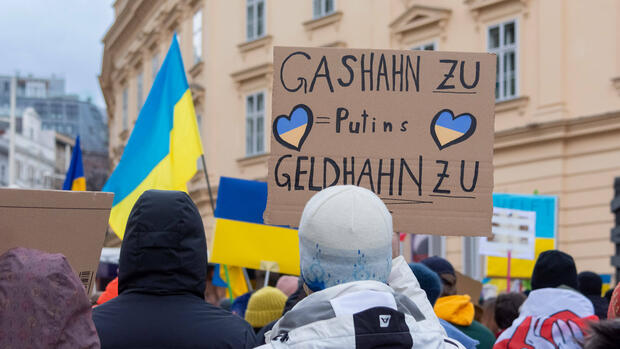Vienna Whenever new figures on Russian gas imports circulate, excitement breaks out in the Vienna government headquarters: After all, the partially state-owned company Gazprom supplies the energy source to Austria, and those who do business with it also finance Russia’s regime and its war in Ukraine. In April, Russian gas accounted for a high 64 percent of total imports, as has recently become known.
The reactions were correspondingly violent. Dependence on Russia is too high, said Green Environment Minister Leonore Gewessler. Before Russia’s major attack on Ukraine in February 2022, Austria had obtained up to 80 percent of the natural gas it imported from Russia. The former Soviet sister countries Hungary, Slovakia and the Czech Republic were also heavily dependent on Gazprom.
Officially, Austria does not want to get any more gas from Russia until 2027, but the government would be happy to be able to drastically reduce the quota before then. That should be difficult: In fact, Austria is hanging on the leash of Russian President Vladimir Putin. He determines the rules of the game, not Austria.
The natural gas flows via the “Brotherhood” pipeline from western Siberia via Ukraine and Slovakia to the “Baumgarten” hub in eastern Austria. Gazprom’s business partner is the state-owned energy and petrochemicals company OMV.
It has two gas contracts with the Russians: one for Germany, which runs until 2030, and one for Austria, which runs until 2040. However, Gazprom no longer supplies gas to Germany under the OMV contract.
In 2014, the then OMV boss Gerhard Roiss (left) and Gazprom CEO Alexei Miller signed a contract that increased Austria’s energy dependency.
(Photo: dpa)
Only the OMV management knows the details of the Austrian contract, but not the government. With a stake of 31.5 percent, the Austrian state is indirectly a major shareholder in OMV, but the contract is subject to commercial secrecy and, of course, the government does not receive preferential treatment over other shareholders.
However, one clause is known and it causes headaches for the government and OMV: the “Take or Pay” agreement. This means that OMV has to pay for the gas whether it buys it or not.
However, Putin is in a better position than OMV in another respect. When the Russians open the gas tap, the energy will inevitably arrive in Baumgarten later, and wholesalers are always grateful buyers. If Austria does not want the gas, there is only one solution: to burn it off in Baumgarten.
Austria is trapped. In 1968, the country was the first Western European country to sign a gas supply agreement with the Soviet Union. Today, Austria is regarded as the country that negligently failed to make itself less dependent on Russian pipeline gas.
>> Read also: Why still Russian gas after Europe flows
However, not all the gas that flows to Baumgarten via the pipeline is also consumed in Austria. According to the gas transit manager AGGM, 8.4 billion kilowatt hours of this came into the country in June, but 3.5 billion kilowatt hours flowed abroad again, mainly to Hungary and Slovenia. In the months before, gas had also flowed to Italy via Baumgarten.
While Austria longs for an end to the gas supply relationship with Russia, Hungary is purposefully relying on Putin’s energy. The country receives gas not only through the Baumgarten node, but also through the Turkstream pipeline from southern Russia. Only in the spring did the country conclude contracts for additional deliveries. Hungarian officials say gas will likely be sourced from Russia by 2050.
So Putin is still doing well in Europe, but that doesn’t mean that Gazprom is always meeting its obligations. Although Gazprom is currently fulfilling the contracts 100 percent, this is by no means permanent. In autumn last year, for example, the quantity supplied was only 30 to 70 percent of the volume agreed with OMV.
The Russian energy company Gazprom has become a problem for Austria.
(Photo: AP)
Russia is therefore an unreliable partner, also because Putin continues to engage in politics with gas. That is why Austria and OMV would like to get rid of their business partner Gazprom not only for moral reasons.
At the same time, Austria’s position is contradictory. As uncomfortable as the country’s gas relationship with Russia is, it is hit by shock waves when it is said once again that gas supplies from Russia are on the brink.
When the Deputy Energy Minister of Ukraine, Yaroslav Demchenkov, indicated in Vienna a month ago that the transit contract between the network operator Naftogaz and Gazprom would only exist until the end of 2024 and that it would not be extended, hectic broke out in Austria.
The gas supply is secure and deliveries are still arriving, the Energy Ministry said in a hurry. And the regulatory authority E-Control said that gas pipeline capacities through Ukraine could still be booked from 2025, according to international rules.
For energy experts in Austria, the matter is clear: In the short and medium term, Austria will probably only get rid of the problem with Russian gas if the EU imposes a gas embargo on Russia.
More: Europe’s unity with Putin is fragile.
